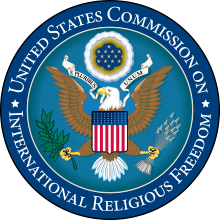


… Iran Factsheet Highlights Senior Sanctioned Officials Responsible for Egregious Religious Freedom Violations
The U.S. Commission on International Religious Freedom (USCIRF) has condemned the death sentence announced on August 10 of 22-year-old Nigerian singer, Yahaya Sharif-Aminu for allegedly insulting the Prophet Muhammad in a song he circulated on the messaging platform, WhatsApp in March.
“Blasphemy laws are inconsistent with universal human rights standards because they fail to respect recognized rights, including freedom of religion and expression,” said USCIRF Vice Chair, Tony Perkins. “The Nigerian government must overturn Sharif-Aminu’s death sentence and repeal blasphemy laws still present in state-sponsored courts.”
Sharif-Aminu’s verdict was passed by a Shari’a court in Kano state, which is one of the twelve states in Nigeria where Shari’a courts operate in parallel with secular state courts. These courts have periodically handed down death sentences, including for blasphemy, though these rulings are rarely carried out.
USCIRF Commissioner Frederick A. Davie stated, “It is unconscionable that Sharif-Aminu is facing a death sentence merely for expressing his beliefs artistically through music. The U.S. Senate should work swiftly to pass S.Res. 458, which calls for the global repeal of heresy, blasphemy, and apostasy laws.”
In its 2020 Annual Report, USCIRF recommended Nigeria as a “country of particular concern,” or CPC, under the International Religious Freedom Act for engaging in or tolerating systematic, ongoing, and egregious violations of religious freedom.
USCIRF has also expressed concern about blasphemy laws in Africa and state enforcement of Shari’a laws in northern Nigeria. To learn more, read the reports: Blasphemy, Apostasy, and Hate Speech Laws in Africa and Shari’ah Criminal Law in Northern Nigeria.
Meanwhile, the USCIRF today released the new Iran Sanctions Factsheet report which highlights key senior Iranian officials who the United States Department of Treasury has sanctioned for their complicity in severe violations of religious freedom. Two successive administrations have utilized the Global Magnitsky Human Rights Accountability Act and several Iran-specific executive orders over the past 10 years to sanction individuals for these violations, which affect Iranians across many different faith communities. The factsheet provides background on several officials linked to Iranian Supreme Leader Ayatollah Ali Khamenei as well as two of the infamous “hanging judges” who are known for having imposed unjustly harsh sentences on Iranian citizens following peaceful protests in 2009.
In its 2020 Annual Report, USCIRF recommended the State Department redesignate Iran as a “country of particular concern” for systematic, ongoing, and egregious religious freedom violations.

